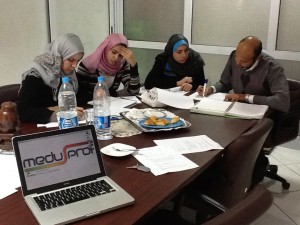 The MeduProf-S Way is – like it implies – the way we work. The MeduProf-S Way is based on, our Mission, General Vision and our Values. It consists of a Vision on Education and Training (see below) and a “Values & Code of Conduct” document regulating the interaction of the learning process.
The MeduProf-S Way is – like it implies – the way we work. The MeduProf-S Way is based on, our Mission, General Vision and our Values. It consists of a Vision on Education and Training (see below) and a “Values & Code of Conduct” document regulating the interaction of the learning process.
This vision on education and training represents the way MeduProf-S staff works. It is to be regarded as an aspiration, an aim that we strive for.
Vision on education and training
MeduProf-S mainly educates and trains professionals in various economic sectors to become and stay “ highly educated, passionate, strongly autonomous experts, whose knowledge is mainly personal and specialised” (Kemenade,2009). These professionals like to use tomorrow, what they have learnt today. Mintzberg (1983) states that professionals do not like to be controlled and prefer to account for their work to peers.
To fit the needs of professionals MeduProf-S follows, in its training and education, the principles of social constructivism. These basic principles are:
- the learner constructs a new reality;
- in meaningful evidence based practice;
- in a learning community
- that requires specific roles and skills of the MeduProf-S staff
- and provides sustainable growth.
The learner constructs
The constructivist learning theory acknowledges that the learners construct their own learning process. In that sense learning is an individual process, where present competences, the personality of the learner, his learning style, his image of the profession and subjective working concept should be taken into account. These factors influence the learning outcomes.
Learning supposes learners are responsible for their own learning process. They tie new knowledge to existing knowledge, they construct their own knowledge and concepts in an active and goal oriented process, they control and assess themselves. Harvey & Newton (2004, 2005) for that reason define quality in education as transformation, the process wherein the learner changes. For education and training this means that learning is an active process with the learner in the centre of the activity. This is often not the way the participants of MeduProf-S education and training learnt to learn. Never the less MeduProf-S strives to stimulate self-regulating learning processes.
Evidence based practice
Simulation of complex practical situations in learning environments facilitates the composition process of learner more than isolated mental processing. MeduProf-S strongly bases its education and training on practice in objective oriented meaningful contexts, on learning by doing. It focuses on increasing – long term – effectiveness of the professional practice. Examples of this concept are the use of practical assignments, skills labs, case studies, problem based learning, projects, apprenticeships and portfolios. This professional practice is thus not just intuitive, but as much as possible evidence based.
Learning community
Although knowledge creation is an individual learning process, it benefits from interaction with peer learners and with teachers. Learning is mainly a cooperative action. Through cooperation, reflection and exchange with the professional practice learners help and support each other in their development of a conscious working concept. The facilitators and trainers discover and use local specific cultures, preferences, needs and opportunities for new initiatives. Such an approach creates new learning communities
The role of the MeduProf-S staff
The MeduProf-S Way asks (new) roles from the staff to function as coaches, tutors, mentors, developers of learning arrangements and assessments, next to the role as professional specialist. Soft skills (personal as well as interpersonal) are crucial for these roles.
Sustainable growth
The MeduProf-S Way of educating and training provides sustainable growth in two ways: its results last via a train the trainer mechanism and social responsibility what gives people ownership of results and methods and helps them to become accountable for further application and development.
